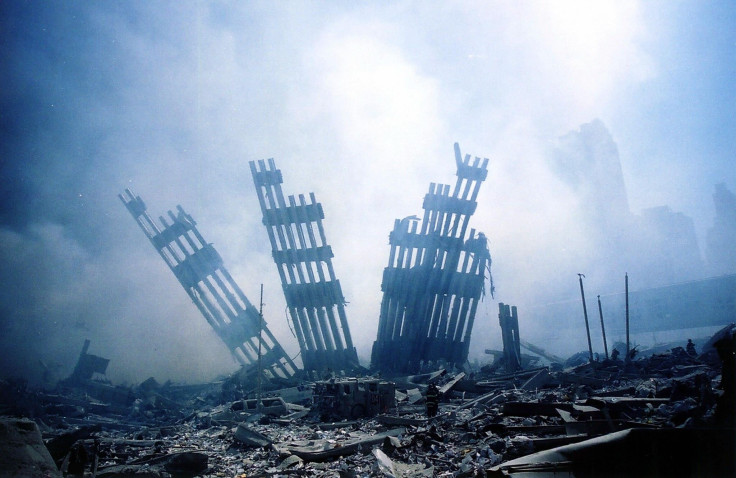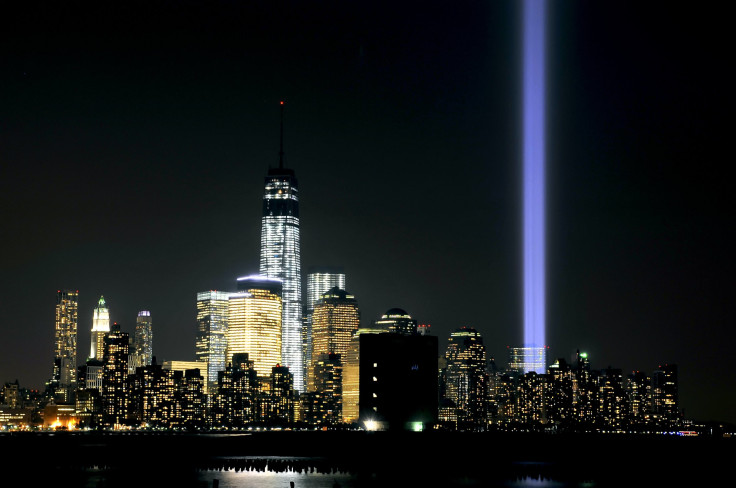9/11 Anniversary 2015 Education Conundrum: How Should Teachers Discuss Terrorist Attacks In Schools?

It wasn’t until a year or two ago that Leigh Campbell-Hale found herself having to explain the events of Sept. 11, 2001, to her students. Before then, “you didn’t have to say much about it,” the 60-year-old history teacher at Fairview High School in Boulder, Colorado, said. “The kids remembered seeing the planes go into the towers.”
These days, however, most high school students are too young to recall the morning of Sept. 11, 2001, when hijackers flew two planes into the World Trade Center in New York City and a third plane into the Pentagon in Arlington, Virginia. Recounting such recent history to students, as well as the context and aftermath -- how the hijackers were soon found to be members of al Qaeda, what constitutes terrorism, or how the Patriot Act, which vastly expanded the government's legal powers to surveil its own citizens, grew out of 9/11 -- has become a controversial and emotional issue for many educators, with some avoiding the subject altogether. With the United States marking the 14th anniversary of the tragedy Friday, teachers across the nation said they are increasingly grappling with the conundrum of whether they should teach students about the attacks of 9/11, and if so, how.
With no formalized curriculum for covering those events more than a decade after the fact, addressing them is at a teacher’s discretion, and strategies vary widely in the face of constraints on time and concerns about testing. The lack of a unified approach and updated textbooks has teachers and education experts alike concerned about how to fill the information vacuum, even as they see struggles in the classroom as paralleling the rocky path of the U.S. itself in piecing together the aftermath of one of the most emotionally charged events in recent history.
“It’s kind of too recent to be history,” Campbell-Hale said. “We’re still in the middle of defining what this moment means,” she added. “The fact that there’s no clear outcome to what happened makes it difficult to teach.”
Some teachers treat 9/11 as an opportunity to teach students, too young to remember the actual events, skills like critical thinking and interviewing. They also use it to foster discussions, such as on Islamophobia or the 2003 invasion of Iraq. Other teachers shy away from those topics because of the potential for controversy, while few teachers incorporate 9/11 into their standard curriculum, often for practical reasons.
San Benito High School students commemorate a #9-11 they don't remember: http://t.co/4FpynYzyjp @BalerNews pic.twitter.com/NjccR0PtuR
— Kate Helland (@katehelland) September 11, 2014
The inconsistency and sparseness of coverage has some teachers and those who study education deeply troubled, not only about students’ education but also about the implications for the future of American democracy. In 2011, 21 states directly mentioned 9/11 in their standards for social studies, according to research by Diana Hess, a professor at the University of Wisconsin-Madison, and Jeremy Stoddard, an associate professor in the School of Education at the College of William & Mary in Virginia.
“I’m worried about all of the dehumanizing narratives that can creep in and that can fill that vacuum in the place of a real, detailed, deep understanding of what happened on 9/11,” said Cheryl Duckworth, an assistant professor at Nova Southeastern University in Florida, who has written a book about how 9/11 is taught in U.S. classrooms.
Duckworth and other experts pointed to the fact that in order have a healthy democracy, students need to develop critical thinking skills and a strong understanding of their history so they can engage with their governments. But while some teachers have adopted creative approaches to broach the subject of 9/11 and develop such crucial skills, that was the exception, not the norm, they said.
'We Saw The Whole Thing Happen'
Ever since 2001, Sept. 11, has been a somber day at Montclair Kimberley Academy, a private school on a hillside in Montclair, New Jersey, that offers a clear view of Manhattan’s skyline 12 miles away.
“We saw the whole thing happen from our dining room and classrooms,” David Flocco, the school’s upper school principal, said. Alumni and parents of students were among the 3,000 people who died in the attacks in 2001.
The school holds a 25-minute assembly every year to commemorate 9/11. Flocco described it as both commemorative and educational, with content varying by year. “The education of 9/11 is really done on 9/11 each year,” he said. Beyond that, the school has no formalized curriculum, and whether teachers chose to address 9/11 in class was up to them.
Farther from the heart of the attacks in New York, Washington, D.C., and Pennsylvania, such school-wide events seem to have faded. Hale-Campbell, in Colorado, estimated that her school held a commemorative event until three or four years ago, “when it became clear that only the adults remembered it.”
If teachers do broach the subject within their classrooms, Sept. 11 is the day they prefer to do so. According to research by Duckworth and the findings of other academics, 65 percent of teachers will teach about 9/11 on or around the day itself. “The teachers either weren’t teaching it, or they were teaching it the day of,” Stoddard, the William & Mary professor, said. Activities tended to be more commemorative than educational.
@Sept11Memorial educators are giving kids, parents and teachers the tools to start a dialogue about 9/11. pic.twitter.com/fMqHjpBhqu
— Jill Cueni-Cohen (@JillCdashC) July 18, 2015
Two reasons most teachers prefer using Sept. 11 to teach about it are purely practical: They don’t have enough time to cover recent history during the school year, and they are concerned about standardized tests, including the Advance Placement exams, which don’t include 9/11.
History curricula tend to be chronological and emphasize events from centuries ago. By the time the school year is close to ending, teachers are struggling to have made it to the end of the Cold War. “There’s a mad race through history that teachers have to go through, so they run out of time,” Peter Levine, a professor at Tufts University’s Jonathan Tisch College of Citizenship and Public Service in Massachusetts.
The prospect of stirring controversy is a third deterrent. Duckworth dubbed this self-censorship the “glass wall,” where teachers try not to wade into anything that can bring on what she said one teacher, after teaching a two-week unit on comparative religion that included Islam, had described to her as "angry parent week."
“I have plenty of colleagues who do not want to touch the subject with a 10-foot pole,” Mark Westpfahl, who teaches history to sixth-and seventh-graders at Capitol Hill, a magnet school in St. Paul, Minnesota, said. “There can be a fear that if they say the wrong thing or purportedly show a different or improper perspective, they might get in trouble with the parents or the district at large.”
In his classroom, Westpfahl said, he uses 9/11 to teach critical thinking, interviewing and other skills. He’ll show his students news coverage from around the world, facilitate discussions about tolerance — highly topical in a city with a large Somali population — and ask students to interview adults about their memories of 9/11. But first, he sends an email to parents, alerting them to his plans.
“If you would like your child to step out while viewing some of the materials, I will completely understand,” read one sentence of an email Westpfahl sent to parents in 2014.
For teachers who shy away from diving into teaching 9/11, avoiding controversy means depriving students of a critical educational opportunity, proponents of teaching 9/11 in classrooms argue. “Was the Iraq War or the Patriot Act the right response? The kids should be aware of the controversy, and should learn certain skills,” Levine said. “Those are very important civic skills and they’re raised by an issue like 9/11."
Create-Your-Own Curriculum
If teachers have adopted careful approaches to 9/11, so have many standard textbooks. Although experts said some nontraditional sources, such as nonprofit organizations or the National September 11 Memorial & Museum in New York, had developed robust 9/11-related teaching materials, if they weren't part of an approved curriculum, then teachers had little incentive to use them. Editions of social studies textbooks from the years after 2001 lacked detail or controversial material surrounding 9/11, Stoddard said.
Early on, “it was very much portrayed as this horrific, largely unprecedented attack on the U.S.,” he said, while later editions lost the nationalistic and emotional overtones.

The later editions were also sometimes stripped of factual details. The 2005 edition of the textbook "The Americans" explained who the 3,000 people who died in the attacks were: “All the passengers on the four planes, workers and visitors in the World Trade Center and the Pentagon, and about 300 firefighters and 40 police officers who rushed into the twin towers to rescue people.” The 2010 edition simply said that 3,000 people had been killed.
Some teachers said they eschewed standard textbooks because they lacked proper context. For others, textbooks were irrelevant, because the ones in their classrooms had not been replaced since 1999.
Whatever teachers decide to do, the choice is hardly a simple one, even as the consequences of choosing to ignore the subject grow ever starker.
“As a social studies teacher, it’s our job to put the controversy in front of the students and let them decide. We’re still really trying to piece together how and why it happened,” Westpfahl said, adding that he has much more to learn. “I’ll be the first to admit: I don’t have all the answers.”
© Copyright IBTimes 2025. All rights reserved.






















